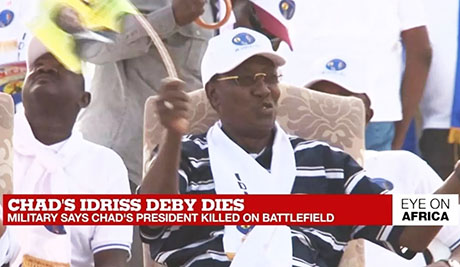Special to WorldTribune, April 22, 2021
One of the world’s longest-serving leaders died Tuesday. Chadian President Idriss Déby, 68, succumbed to wounds sustained while visiting troops fighting rebels in the northern region of Kanem. Fears of violence gripped the African nation as news of Déby’s death spread.
The news came hours after Deby – who has led Chad for more than three decades – had been declared the winner of an April 11 presidential election although ballots were still being counted.

Deby was a significant ally of the West, France in particular, in the fight against militant Islam in Africa.
Recent fighting and unrest was eyed with concern by western embassy officials who regarded Déby as buffer against Islamist extremist groups, including Boko Haram in the Lake Chad Basin and groups tied to Al Qaida and the Islamic State in the Sahel.
“Marshal Idriss Déby Itno, as he did each time that the institutions of the republic were gravely threatened, took control of operations during the heroic combat led against the terrorists from Libya. He was wounded during the fighting and died once repatriated to N’Djamena,” army spokesperson Azem Bermendao Agouna said according to a Guardian report.
On April 16, the United States Embassy in N’Djamena issued a “Security Alert” citing “the presence of armed non-governmental groups in the North of Chad.”
The following day, the U.S. Embassy renewed the alert adding, “The previously reported armed non-governmental groups in northern Chad have moved south and appear to be heading toward N’Djamena. Due to their growing proximity to N’Djamena, there is the possibility for violence in the city.”
The situation further deteriorated on April 19. Reuters reported,
“A spokesman for the rebel Front for Change and Concord in Chad (FACT) said its fighters had ‘liberated’ the province of Kanem, some 220 km (136 miles) from the capital N’Djamena, but the government denied this.”
Déby’s death comes at a crucial time for the country. Ballots were still being tallied from the recent presidential elections that Déby was widely expected to win. FACT rebels had attacked polling stations from neighboring Libya on April 11, the day of the disputed presidential elections.
In the 1970s Déby, the son of a goat herder, entered the military before being sent to France to train as a military pilot. He returned in 1979 and was made commander-in-chief of the army for backing Hissène Habré for the presidency.
The acting army chief’s popularity rose as he commanded troops in the mountainous regions of northern Chad against rebel fighters and war lords. In 1989, after a falling out with Habrém, Déby was forced into exile in neighboring Sudan before returning to take power in an armed coup in 1990.
In the early 2000s, Déby emerged as a key alley in west’s fight against Islamic insurgencies in the North Africa. On April 20, the day Déby died, U.S. Africa Command commander Gen. Stephen J. Townsend, was testifying before the House Armed Services Committee on the spread of violent extremism in the Sahel.
On Tuesday, Chad’s military council announced 18 months of transition headed by Idriss Déby’s son, Mahamat, until new elections can be held. Chad remains on edge as a nation-wide curfew was placed in effect following the abrupt departure from Déby’s 30-year-rule.
